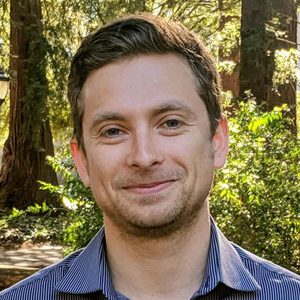
Enjoy presentations by this year’s recipients of the Phillip and Ruth Hettleman Prizes for Scholarly Achievement. The talks will provide an engaging look into these distinguished early career scholars’ work. The late Phillip Hettleman, a member of the Carolina class of 1921, and his wife Ruth established their prestigious named award in 1986 to recognize the achievements of outstanding junior faculty.
Check out all of the Hettleman Winner’s Presentations throughout the week:
- Het Talks: Sarah Cohen and Alex Zhukovitskiy
- Het Talks: Lindsey James and Angel Hsu
- Het Talks: Marissa Hall and Kathryn Leech
These are virtual, CLE Credit events.
Recorded Webinar:
2025 Hettleman Winners
 Sarah Cohen, Cell Biology and Physiology, School of Medicine
Sarah Cohen, Cell Biology and Physiology, School of Medicine
Cohen, a member of the UNC Lineberger Comprehensive Cancer Center, is creating a better understanding of brain health by studying the interactions of organelles — subcellular structures like nuclei and mitochondria that perform specific jobs in cells. Her work focuses on organelle dynamics and fatty acid trafficking in and between cells, particularly in the context of the central nervous system.
Her lab uses cutting-edge multispectral imaging and computational tools to visualize and quantify these interactions in real time, revealing how disruptions in lipid trafficking contribute to neurodegenerative diseases like Alzheimer’s and Parkinson’s. To do this work, Cohen and her team developed a versatile fluorescent toolkit that allows researchers to visualize dynamic membrane contact sites between organelles. These tools have been widely adopted by labs around the world, accelerating discoveries in cell biology.
 Alex Zhukhovitskiy, Chemistry, College of Arts and Sciences
Alex Zhukhovitskiy, Chemistry, College of Arts and Sciences
Zhukhovitskiy is reshaping the landscape of polymer chemistry through a concept he helped define: polymer backbone editing. He leads a research program that reimagines how polymers — long chains of repeating molecular units — can be transformed at their core. His lab focuses on three major areas: skeletal editing of polymer backbones, supramolecular engineering of entanglements, and the development of new mechanisms for controlled polymer synthesis.
Zhukhovitskiy’s work on skeletal editing allows chemists to insert, delete, or rearrange atoms within the backbone of a polymer, fundamentally altering its identity and properties. His team’s development of novel chemical reactions to convert one class of polymers into another enables the creation of materials that were previously inaccessible. In parallel, his group has devised methods to precisely control entanglements — mechanical connections between polymer chains — using supramolecular chemistry and has innovated new catalytic strategies for building nitrogen-rich and semiconducting polymers.
